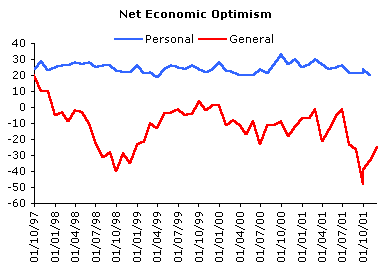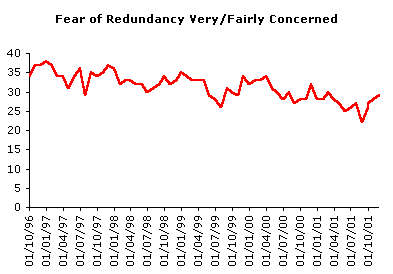The Economy And The Euro
The September 11 attacks in the USA were followed by a dramatic slump in economic confidence in Britain. MORI's Economic Optimism Index (EOI) at the end of September hit -56, its lowest point since the early 1980s, exacerbating an already precarious situation. (The August figure, -31, was already the lowest since November 1998).
Yet less than four months later, the Christmas consumer boom (the CBI has just reported annual sales growth higher than in any December since 1987), and the continuing resilience of house prices, might seem to suggest that the impact of September 11 on the public has been short-lived. But in fact - although it is true that economic confidence has recovered somewhat since September - the explanation may be elsewhere. Measures of economic confidence such as the MORI EOI are sometimes referred to as "consumer confidence" figures, but this is misleading. Consumers do not necessarily draw a pessimistic view of their own prospects from a negative view of the national economy, or carry it through to their purchasing behaviour.
MORI Financial Services regularly tracks economic confidence using the familiar question "Q. Do you think that the general economic condition of the country will improve, stay the same or get worse over the next 12 months?"; but they also track consumers' impressions of their own personal prospects, "Do you think that your personal financial circumstances will improve, stay the same or get worse over the next 12 months?".
 Base: All full
6th - 11th Dec 2001
Base: All full
6th - 11th Dec 2001
As the graphs show, the personal measure has been far less volatile than the general economic one, and the balance of opinion is comfortably on the optimistic side of the equation. The September 11 attacks had little impact on these figures - Britons expected the economy as a whole to suffer but did not expect to be affected themselves. On a more specific question, measuring fear of redundancy, it is a similar tale.
Q How concerned would you say you are about the possibility of being made redundant or becoming unemployed over the next twelve months?
 Base: All full/part time workers
6th - 11th Dec 2001
Base: All full/part time workers
6th - 11th Dec 2001
As Britain goes through this perhaps unexpected consumer boom, putting pressure on the Bank of England to raise interest rates and so diverge further from European Central Bank, on the continent the single currency notes and coinage are being launched across the 12 countries of the Euro-zone, prompting inevitable speculation as to when, if at all, Britain will join in - or, rather, when the government will risk holding the referendum it has promised before entry is possible.
We await the first poll on British attitudes to the Euro since the turn of the year with interest, but it seems unlikely to find an immediate divergence of any size from the generally steady trend of last year which continued to find Britons instinctively opposed to entry, by two-to-one or more but also prepared, in substantial numbers, to consider changing their minds should the arguments seem to justify it. A high proportion of Britons still keep an open mind on the perfectly reasonable basis that they don't (yet) know enough to come to a decision.
ICM's poll in the Guardian last month explored one facet of the British public's knowledge of the Euro. They found that 56% said they thought, correctly, that Ireland would adopt the Euro on 1 January, and 54% said the same about Greece. On the other hand only 34% knew that Finland was also joining, while 11% supposed that Russia would, and a similar number thought that Britain would join. Meanwhile 6% thought that none of the five would "adopt the Euro as their currency on 1st January 2002". (It could be argued, I suppose, that this is strictly correct, since it is only the notes and coinage that have been newly introduced in the Euro-zone, the currency itself already being in operation.)
Although the launch the new currency seems generally to have gone smoothly, it would be wrong to suppose that the change has overwhelming public support on the continent. Indeed, it seems majorities in many of the countries where the notes and coins went into circulation this week would prefer to keep their own national currencies: a GfK poll for the Wall Street Journal Europe, conducted in September and October but published just before Christmas, found 62% of the French said they would prefer to keep the franc and 57% in Germany preferred the Deutschmark, and the majority were also against the Euro in Finland and Spain.
Although most Britons say they would vote against joining the Euro, that is not to say that they do not expect it to happen. On the contrary, most do, despite their opposition. ICM last month in the Guardian found 62% thinking that in ten years time, "the Euro will be the currency of most of Europe, Britain included", whereas only 14% thought Britain would be excluded (and 19% that by then the Euro will have failed and each country will have its own currency). Similarly, MORI found in June, in a survey for GrahamBishop.com [Joining The Euro], that 43% think it "very likely" and a further 31% "fairly likely" that Britain will be using a single European currency and coinage in 2010. But there is nothing very new about this - the 74% who thought it likely in June 2001 compare to the hardly fewer 70% who said the same in January 1998.
Q How likely or unlikely is it that people in Britain will regularly use a single European currency and coinage in 2010? *
| 160 | Jan | Feb | Sep-Oct | Jan | Jun |
| 160 | 1998 | 1999 | 2000 | 2001 | 2001* |
| 160 | % | % | % | % | % |
| Very likely | 35 | 36 | 25 | 29 | 43 |
| Fairly likely | 35 | 31 | 36 | 39 | 31 |
| Fairly unlikely | 9 | 9 | 16 | 14 | 9 |
| Very unlikely | 10 | 11 | 10 | 8 | 3 |
| Don't know | 11 | 13 | 13 | 10 | 14 |
| Likely | 70 | 67 | 61 | 68 | 74 |
Source: MORI * In June 2001 only, asked as "Q. Whatever your personal view of membership, how likely or unlikely is it ...?"
Of course, there has been some fluctuation of the figures in the interim, and the strength of certainty seemed greater in the most recent poll (though it is possible that even this finding may only reflect a change in the question wording), but there has certainly been no sea-change in the public's expectations for the future over the past few years. Nor, by the way, have the public told us they think British entry is "inevitable", although that tends to be the way the headline writers report it; they think it "likely", rather a different kettle of fish.
But that still leaves the government the hurdle of winning the promised referendum, whenever they decide to hold it. The MORI/GrahamBishop.com poll in June gives some idea of the sort of arguments that the waverers feel might sway them in favour. A conviction of solid economic benefit for Britain seems of most importance, though a significant number also want reassurance that economic union will not lead to political union.
Q You said that you could be persuaded to change your mind in favour of British participation in the European single currency. Which, if any, of these reasons, would persuade you?
| 160 | % |
| If I was convinced that Britain's economy had lost jobs, trade-unions and investment by staying out of the euro | 37 |
| If I thought that the euro had became a successful currency | 27 |
| If I thought the euro will bring cheaper prices | 24 |
| If I was persuaded that the euro will not lead to a United States of Europe with a federal government | 24 |
| If the Prime Minister and the Chancellor convinced me that joining the euro is in the national interest | 22 |
| If I thought that the euro had helped improve Europe's economy | 19 |
| If I thought the euro would bring cheaper mortgages | 17 |
| If I felt that Britain had lost influence in the European Union by staying outside the euro | 16 |
| If Europe's economy became more competitive | 13 |
| If the pound stayed overvalued against the euro | 11 |
| If the Chancellor's 'five economic tests' for joining the euro were met | 7 |
| If I got used to using European notes and coins when travelling | 5 |
| Other | 1 |
| None of these | 3 |
| Don't know | 3 |
Source: MORI/GrahamBishop.com Base: All respondents 15+ generally opposed to Britain joining the euro but who might be persuaded in favour (467), 14-19 June 2001
On the other hand, if there is one thing liable above all others to antagonise the electorate and make winning a referendum harder, it is a feeling that they are being taken for granted. The public does not want to be "bounced" into the Euro and fears that it may be; it is crucial for the government that it should not stoke up mistrust on this issue. (In a June 2000 MORI poll for the News of the World, three in five of the public thought that "The government will try to bounce the British public into agreeing to join the euro", and half that "The government are trying to hide the real facts about the euro from the public", while only a quarter agreed that "The government has tried to encourage a sensible public debate on the euro". It seems unlikely many will have changed these views in the succeeding 18 months.) Ministers who allow themselves to be quoted as thinking that British entry is "inevitable" are doing themselves, and the government, no good.



